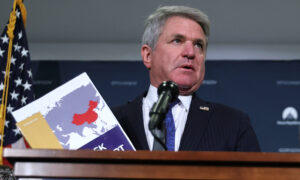A leading Congressional Republican is planning a tour of Asia that will likely include a stop in Taiwan.
Rep. Michael McCaul (R-Texas), who chairs the House Foreign Affairs Committee, said that he intends to visit the democratic island later in the year to assist it in the struggle against communist China’s repressive overtures.
“I have a trip planned in the springtime to visit Taiwan, and also Japan and South Korea, who are our allies in this war of oppression versus democracy and freedom,” McCaul said during a Feb. 7 interview with The Epoch Times.
A spokesperson for McCaul’s office separately confirmed that McCaul is planning a visit to Asia, which will focus on strengthening the United States’ alliances in the region, but said that a date and itinerary had not yet been set.
McCaul said that demonstrating American support was important to ensure that the Taiwanese knew they were not alone and to deter China’s communist regime from attempting an invasion of the island.
“I think it’s important that we show Taiwan that we support them,” McCaul said.
“And it’s also important to show that the American people support Taiwan as a deterrence against Communist China from ever thinking about invading that island.”
China Continues to Threaten Taiwan
The Chinese Communist Party (CCP), which rules China as a single-party state, claims that Taiwan is a rogue province that must be united with the mainland.
CCP officials have vowed to compel the island into unity with the regime by any means necessary, and have claimed that they are willing to initiate a war to make that dream a reality.
Despite the CCP’s claims, Taiwan is a democratic power with a thriving market economy that has maintained its de facto independence since 1949 and has never been controlled by the CCP.
U.S. military leadership has variously cautioned that the CCP could attempt to launch an invasion of Taiwan in 2027 or even 2025.
Wargames conducted by think tanks have suggested that Taiwan could weather an invasion by China if the United States and Japan intervened on its behalf. However, such a conflict would carry heavy costs for all involved.
For its part, the Biden administration has attempted to stymie the risk of overt conflict and has repeatedly called for all sides to focus on limiting the scope of their competition.
“The president believes that we should be in a competition with China and that it should not evolve into conflict,” said White House National Security Council Coordinator for Strategic Communications John Kirby in a January interview with CNN. “There’s no reason for it to.”

